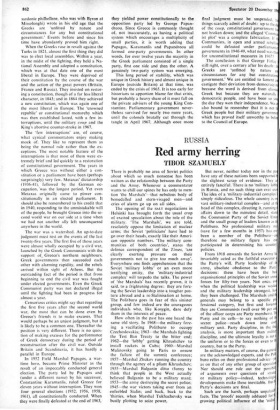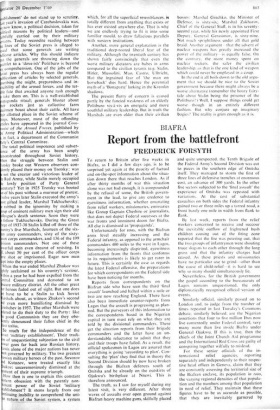RUSSIA
Red army herring
TIBOR SZAMUELY
There is probably no area of Soviet politics about which so much nonsense has been written as the relationship between the Party and the Army. Whenever a commentator wants to chill our spines he has only to men- tion 'the Marshals'—that nebulous body of bemedalled and stern-visaged men—and cries of alarm go up on all sides.
The opening of the SALT negotiations in
• Helsinki has brought forth the usual crop of excited speculation about the role of the military. 'The Marshals', we are told, resolutely oppose the limitation of nuclear arms; the Soviet 'politicians' have had to go over their heads, exactly like their Ameri- can opposite numbers. 'The military com- munities of both countries', states the defence correspondent of the Times, 'are clearly exerting pressure on their governments not to give too much away'. Everywhere one finds apprehension that the Soviet 'military lobby' or an even more terrifying entity, the 'military-industrial complex' will torpedo the talks. The power of 'the Marshals' has recently grown, it is said, to a frightening degree: they are forc- ing the Soviet leadership into a tougher pos- ture abroad and a re-Stalinisation at home. The Politburo goes in fear of this sinister group, and few indeed are the courageous individuals who, like Kosygin, dare defy them in the interests of peace.
How often in the past has one heard the same old story. In 1968—the military forc- ing a vacillating Politburo to occupy Czechoslovakia; 1963—the Marshals fighting the Test Ban Treaty to the bitter end; 1962—the 'lobby' getting Khrushchev to install rockets in Cuba; 1960—Marshal Malinovsky going to Paris to ensure the failure of the summit conference; 1957—Marshal Zhukov running the country through the agency of a pliant Khrushchev; 1955—Marshal Bulganin ditto (funny to think that people in the West actually believed Bulganin to be a military man); 1953—the army destroying the secret police; 1945—the war victors taking over from an enfeebled Stalin; and back, back to the 'thirties, when Marshal Tukhachevsky was busily plotting to seize power.
But never, neither today nor in the pa have any of these notions been supported the slightest scrap of evidence. They a entirely fanciful. There is no `military lob in Russia, and no such thing can ever exi The idea of a 'military-industrial complex' simply ridiculous. The whole country is o vast military-industrial complex—and at t head of this complex, directing it, running affairs down to the minutest detail, stan the Communist Party of the Soviet Uni and the small group of leaders known as Politburo. No professional military m (save for a few months in 1957) has e‘ been a member of the Politburo—a therefore no military figure has e; participated in determining his country policies.
From 1.918 onwards the Soviet Army h invariably acted as the faithful executor the Party's will. Party leadership of army, absolute obedience to the Pam decisions: these have been the ha organisational principles of the Soviet arm forces for fifty-two years. Not once, eV when the political leadership was weak and the military leadership strongest, ha they been challenged. The Marshals and generals may belong to a specific p fessional category, but first and forem they are Communists (well over 90 per of the officer corps are Party members).
Party and its cells—to say nothing of secret police—reach down into 0. military unit. Party discipline, in the fi analysis, is more important than milli discipline, and the ultimate loyalty is not the uniform or to the forces or even to country, but to the Party.
In military matters, of course, the gene are the acknowledged experts, and the Po buro relies on their professional advice—I as on that of any other group of special!
Nor should one rule out the possib of arguments over questions of strat or military policy—indeed, technolo developments make these inevitable. But Party's decisions are final.
Such are the harsh, perhaps unpalata facts. The 'proofs' recently adduced for growing political influence of the 'inib blislunent' do not stand up to scrutiny. year's invasion of Czechoslovakia was, now know, a political decision, taken for litical reasons by political leaders—and "thfully carried out by their military rsants. Today recondite reading between lines of the Soviet press is alleged to seal that some generals are writing Ilicose articles. Why this should indicate t the generals are throwing down the untlet to a 'clove-ish' Politburo is beyond y comprehension. One of the jobs of the net press has always been the regular blication of articles by selected generals, ribing the might, preparedness and in- ncibility of the armed forces, and the ter- hle fate that awaited anyone rash enough take them on. This is a well-established paganda ritual; generals bluster about or rockets just as collective farm airmen boast about their cattle. All have .r allotted place in the Soviet scheme of ngs. Moreover, most of the offending ides have appeared in the journal Com- mis: of the Armed Forces, published by Army Political Administration—which in fact, a department of the Communist rty's Central Committee.
The total political impotence and subser- ence of the army has been amply onstrated throughout Soviet history. *hen the struggle between Stalin and rotsky broke out Western observers con- ently placed their money on Trotsky: was not the creator and victorious leader of Red Army, while Stalin merely occupied
lowly position of Party General retary? Yet in 1925 Trotsky was booted at of his post without a murmur of protest. welve years later Stalin executed the army's ost gifted leader, Marshal Tukhachevsky; rubbed in the ignominy by making a oup of eminent military men sign their old Ileague's death sentence. Soon they were follow Tukhachevsky. During the Great ge of 1937-38 Stalin killed off three of the untry's five Marshals, fourteen of the six-
army commanders, sixty of the sixty- en corps commanders, and 136 of the 199 vision commanders. Not one of these werful men even dreamt of resisting. In , about 50 per cent of. the officer corps re shot or imprisoned. Eager new men Pt into the empty places.
When the war ended Marshal Zhukov was htly acclaimed as his country's saviour. 'thin a year he had been expelled from the ntral Committee and demoted to an ure military district. All the other great ar heroes faded out of sight. But one does t have to be' a Stalin to kick Soviet arshals about, as witness Zhukov's second d even more humiliating dismissal by shchev in 1957. The other Marshals were ered to do their duty to the Party: like good Communists they are they ()Ise- ult), denounced their fallen chief in the est terms.
So much for the independence of the viet cmilitary establishment'. Their tradi- n of unquestioning subjection to the civil wer goes far back into Russian history. ussia alone of the major nations has never fl governed by military. The two greatest ussian military heroes of the past, Suvorov Kutuzov, were treated exactly like ukov: unceremoniously dismissed at the oment of their supreme triumph.
How then is one to explain this constant tern obsession with the patently non- sten{ power of the Soviet 'military blislunent'? It stems largely from our ttnuing inability to comprehend the uni- nature of the Soviet system, a system
which, for all the superficial resemblances, is totally different from anything that exists or has ever existed anywhere else. That is why we are endlessly trying to fit it into some familiar mould, to draw fallacious parallels with western institutions.
Another, more general explanation is the traditional deep-rooted liberal fear of the military. Although the twentieth century has shown fairly convincingly that even the worst military dictators are babes in arms compared to the civilian tyrants (e.g. Stalin, Hitler, Mussolini. Mao, Castro, Ulbricht, Ho) the ingrained fear of 'the man on horseback'. dies hard. Hence the perennial myth of a 'Bonaparte' lurking in the Kremlin shadows.
The present flurry of concern is caused partly by the fancied weakness of an elderly Politburo vis-à-vis an energetic and more youthful military leadership. But in truth the Marshals are even older than their civilian
bosses: .Marshal Grechko, the Minister of Defence, is sixty-six; Marshal Zakharov, Chief of the General Staff, is in his seventy- second year, while his newly appointed First Deputy. General Gerasimov, is sixty-nine. Not much sprightliness under all that gold braid. Another argument ---that the advent of nuclear weapons has greatly increased the power of the military—is equally false. On the contrary, the more money spent on nuclear rockets, the safer the civilian leadership. as that is the one kind of weapon which could never be employed in a coup.
In the end it all boils down to the old argu- ment that we should be nice to the Soviet government because there might always be a worse alternative (remember the hoary fairy- tale about Stalin being the prisoner of the Politburo?) Well, I suppose things could get worse --though in an entirely different fashion. But why conjure up imaginary bogies? The reality is grim enough as it is.



































 Previous page
Previous page